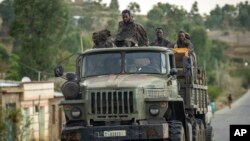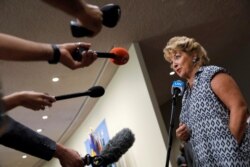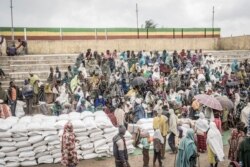U.N. Secretary-General Antonio Guterres will brief the Security Council on Wednesday regarding Ethiopia's recent expulsion of seven senior U.N. aid officials.
It is the second council meeting in less than a week on Ethiopia, where the federal government of Prime Minister Abiy Ahmed announced on September 30 that the aid officials had 72 hours to leave the country.
"The expulsion of these aid workers is one more step in what is a momentum that is going in the wrong direction in terms of deterioration," said Ireland's U.N. ambassador, Geraldine Byrne Nason, who requested the meeting on behalf of her government.
Byrne Nason said it is important the aid officials be restored to their positions and the relationship between the United Nations and the Ethiopian government be mended.
"It is a critical relationship," she told reporters. "This is not the position we need to be in right now. We need to see, if anything, a scaled-up humanitarian effort, not one where there is any dispute."
Ethiopia alleges that the officials meddled in its internal affairs and leveled other charges, including that they diverted aid and telecommunications equipment to the Tigray People's Liberation Front (TPLF), which the government has been fighting in the north of the country for nearly a year.
The officials who were declared "persona non-grata" include the U.N. deputy humanitarian chief, the deputy humanitarian coordinator, and the U.N. children's agency (UNICEF) representative.
On Monday, the United Nations confirmed the officials were no longer in the country.
"They have been moved from the country to ensure their safety," U.N. spokesman Farhan Haq told reporters, noting that the U.N. depends on the host country for staff safety.
The U.N. says the officials have done nothing wrong, and that Ethiopia does not have a legal basis to expel them. U.N. staff are protected under immunity conventions and the U.N. Charter. The organization maintains that such expulsions can only happen on a country-to-country basis.
Millions in need
The Ethiopian federal government has been engaged in an armed conflict with TPLF forces in the northern Tigray region for nearly a year. The government announced a unilateral cease-fire and withdrew its forces from the region in June, but the conflict has spilled into the neighboring regions of Amhara and Afar.
Of the 6 million people who live in Tigray, the U.N. says 5.2 million need some level of food assistance. More than 400,000 people are already living in famine-like conditions, and another 1.8 million people are on the brink of famine.
On Tuesday, the World Food Program said it had completed its first round of food aid distributions to people impacted by the spread of the conflict into Afar and Amhara.
"WFP says anecdotal reports from Tigray, Afar and Amhara provinces suggest that food insecurity is rising as families flee from their homes and have their livelihoods destroyed," U.N. spokesman Stephane Dujarric told reporters.
The U.N. has said for months that it has encountered difficulties in reaching the people of Tigray. One hundred aid-filled trucks are needed daily to meet the soaring needs, but since mid-July, only 637 have been allowed into the region. Fuel and cash are also scarce.
Last Wednesday, U.N. humanitarian chief Martin Griffiths said that after 11 months of conflict and three months of a de facto government blockade, the humanitarian crisis in Tigray is spiraling out of control.
In an interview with The Associated Press, Griffiths said the humanitarian crisis there is a "stain on our conscience," as civilians starve because aid workers are being blocked from getting enough supplies to them.
The next day, the government in Addis Ababa said it was expelling the seven high-ranking U.N. staffers.






